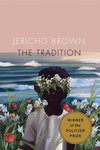“The Tradition” by Jericho Brown, published in April of 2019 by Copper Canyon Press of Port Townsend, has won the 2020 Pulitzer Prize in Poetry.
Brown’s win puts him in the …
This item is available in full to subscribers.
We have recently launched a new and improved website. To continue reading, you will need to either log into your subscriber account, or purchase a new subscription.
If you had an active account on our previous website, then you have an account here. Simply reset your password to regain access to your account.
If you did not have an account on our previous website, but are a current print subscriber, click here to set up your website account.
Otherwise, click here to view your options for subscribing.
* Having trouble? Call our circulation department at 360-385-2900, or email our support.
Please log in to continue |
|


“The Tradition” by Jericho Brown, published in April 2019 by Copper Canyon Press of Port Townsend, has won the 2020 Pulitzer Prize in Poetry.
Brown’s win puts him in the company of fellow Copper Canyon Press poets Arthur Sze, Ted Kooser, Jean Valentine, Ruth Stone, W.S. Merwin, Carolyn Kizer, Maurice Manning, Sarah Ruhl, Lucille Clifton, Lucia Perillo, Charles Simic, Dean Young, Gregory Pardlo, Forrest Gander and Heather McHugh.
THE POET, IN HIS OWN WORDS
Brown is an associate professor and the director of the Creative Writing Program at Emory University, yet his tone during his phone interview with The Leader was far more joyous than professorial, and when told that his interviewer had never interviewed a Pulitzer Prize-winning poet before, Brown burst into effusive laughter and said he was new to being interviewed as a Pulitzer Prize-winner in turn.
Brown credited his job with inspiring the most recent burst of poetry-writing that led to “The Tradition,” since he’d had to review a concentration of fiction-writing, “which I hadn’t done in a while.” Those “pages upon pages” of fiction reminded him of the reasons for his preference for poetry.
While some poems had been written earlier and held from publication in his previous books, Brown estimated that 66% of the poems that appeared in “The Tradition” were written between Thanksgiving 2017 and Martin Luther King Day in 2018.
“I was overcome and used every gift I had as a writer,” Brown said. “I’d be getting lines that made me pull the car over to the side of the road, or take notes on my phone in the elevator. It was exhausting.”
Brown wasn’t thinking in terms of critical acclaim, much less potential Pulitzer recognition, when he wrote “The Tradition,” because he was appreciating how fully he finally felt connected to all the skills and insights he’d acquired in the field of poetry over the years.
“There are about 300 books of poetry published each year, so just by those odds, you’ve got a one-in-300 chance winning of the Pulitzer,” Brown said, before laughing. “Those are better than lottery odds, but they’re still not great. What I was conscious of at the time was that these poems were some of the best work I’d done in my life. I was accessing the full range of my experience.”
That experience included the act of composing poetry itself, which Brown likened to a spiritual communion.
“It’s an act of prayer,” he said. “When you’re writing poetry, you’re calling out to an imagined world. If I can experience surprise and cry in the moment when I’m composing poetry, then the hope is that this can happen to the person who’s reading it, whether they share anything in common with me or not.”
Indeed, Brown explained that his writing is driven by what he wants to see as a reader.
“I try to write something I’ve never seen before, in spite of everything that I’ve seen,” Brown said. “I love when my work can fill in what I feel are missing spaces. I want to write books that I’d like to read. I’m writing for that person who’s like I was at 19, when I was at risk and needed poems to save my life.”
At the same time, nailing down a definitive interpretation of his own work is anathema to Brown.
“Most writers want readers to be able to bring their own interpretations to their works,” Brown said. “Readers should be able to bring their own lives to their readings of the material.”
Brown believes the proper role of poetry is to act as both a soothing balm to its readers’ wounds and a challenge to their worldviews, offering them solace even as it makes them uncomfortable.
“When you think about it, reading is an amazing act,” Brown said. “You’re holding this creation in your hand, and when you look at the words and characters on the page, it makes you see things in your mind.”
If someone is either new to poetry, or hasn’t had the most positive of experiences with it before, Brown encourages them to give it another try.
“You read poems the same way you read anything else, from left to right,” Brown said. “So many people think that, after you’ve read the first line of a poem, you have to grapple with it or interpret it before you can move onto the second line. We can all enjoy the beauty of listening to music, even though many of us don’t even know the words to what we say are our favorite songs. If you find poems you like and enjoy, and you’d like to know more, then you can do some decoding.”
Brown said that even if you’ve already encountered poetry that’s put you off, there’s still countless other poems out there.
“You’re not going to like every song, or statue or painting that you come across,” Brown said.
COPPER CANYON’S TAKE
Michael Wiegers, editor-in-chief at Copper Canyon Press, knew Brown had written “a special and rare book” from the moment he first read the manuscript for “The Tradition.”
“And now, as much as the Pulitzer Prize celebrates a particular book, we are also celebrating a way of thinking, feeling and witnessing in the world,” Wiegers said. “As Jericho’s publisher, we’ve watched as many readers and reviewers have circled around this book lovingly, as if to celebrate and protect a compassionate way of being in the world.”
Wiegers deemed the Pulitzer the culmination of “the deserved recognition of what we believe to be one of the most significant books to be published in 2019,” and just as Brown’s other readers have done, Wiegers asserted the Pulitzer judges “are partaking in a larger literary tradition that demands beauty as an antidote to challenge,” by highlighting a book of poems that “humbly lights a candle against the growing dark and unease.”
Copper Canyon Press has now won three Pulitzer Prizes in Poetry. The two previous winners were “The Shadow of Sirius” in 2009, by W.S. Merwin, and “Delights & Shadows” in 2005, by Ted Kooser.
When asked what puts “The Tradition” in the company of these two other titles, Copper Canyon Press co-publisher Joseph Bedarnik said, “Quality, artistic ambition, clarity. A willingness to stare hard at a difficult world and create sublime art that speaks to the human condition, to bring forth a nourishing signal amidst a cacophony of noise, and to seduce readers into a poem and change their perception of themselves and the world.”
Bedarnik sees “The Tradition” as continuing Copper Canyon Press’ tradition of bringing poetry to the world that is not only relevant, but arguably essential to it.
“If ever there was a book that was vital to language and living, it is Jericho Brown’s ‘The Tradition,’” Bedarnik said. “Here is a brilliant poet, black and queer, confronting violence and the coarse normalization of evil with words and new poetic inventions.”
In Bedarnik’s estimation, “The Tradition” falls within Copper Canyon’s long tradition of publishing “politically astute work,” from June Jordan and Kenneth Rexroth to Thomas McGrath and Ellen Bass.
According to Bedarnik, Copper Canyon Press is always on the lookout for dynamic new voices.
“Our editorial team reads widely, attends conferences and advocates strongly when they encounter the real deal,” said Bedarnik, who noted that Copper Canyon Press not only published “The Tradition,” Brown’s third book, but also his second, “The New Testament,” and “we look forward to publishing his fourth.”
Bedarnik added, “Over the past several years, many of the young poets we have published—Ocean Vuong, Javier Zamora, Monica Sok, Sherwin Bitsui—have received well-deserved accolades and enjoyed a wide readership. What more could a publisher ask for?”